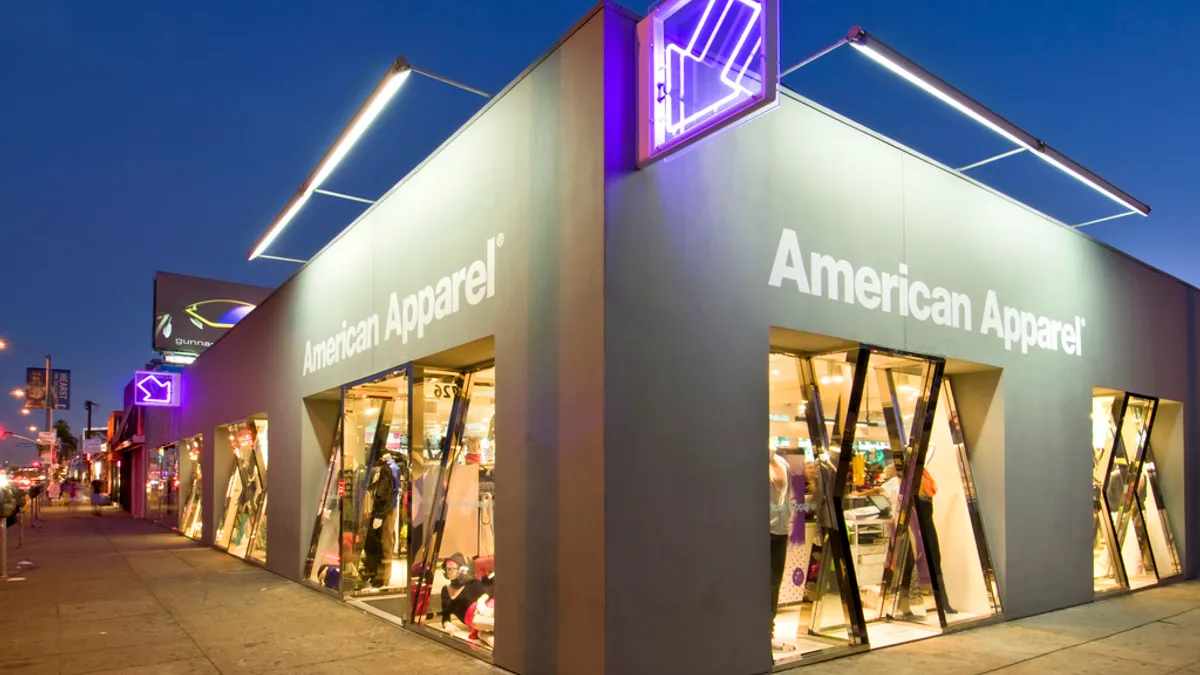Dive Brief:
-
American Apparel CEO Paula Schneider will depart her post on Oct. 3, sources told Women’s Wear Daily, which reports that general counsel and Chief Administrative Officer Chelsea Grayson is already working to transition into the CEO position.
-
Schneider, named CEO in late 2014 while American Apparel was still doing battle with its founder, Dov Charney, suggested that the retailer’s ongoing efforts to find a buyer for all or some of its assets got in the way of her objectives, according to her letter of resignation, obtained by WWD. “[T]he [turnaround] plan has been laid out and much of the heavy lifting and the hard work has been done," the letter reads. "[T]he sale process currently underway for all or part of the company may not enable us to pursue the course of action necessary for the plan to succeed nor allow the brand to stay true to its ideals. Therefore, after much deliberation, and with a heavy heart, I’ve come to the conclusion it is time for me to resign as CEO.”
-
Schneider’s move comes soon after the exit of American Apparel’s chairman of the board Paul R. Charron, former Liz Claiborne chairman and CEO, who only joined the board in March. Brad Scher, founder of New York City-based Ocean Ridge Capital Advisors, has taken Charron's place.
Dive Insight:
Schneider was there while founder Charney worked both in and out of court to get American Apparel back. She was there when the retailer went into bankruptcy, and she was still there when the company rejected Charney’s $300 million takeover bid, which topped the value range put forth by American Apparel's own bank.
She won’t be there much longer, however.
Charney was ousted over what American Apparel said were violations of company policy, claims he has always maintained (to reporters, lawyers and the court) were baseless. When U.S. Bankruptcy Judge Brendan Shannon rejected Charney’s attempt to take over the company, he said that Charney’s argument boiled down to the idea that American Apparel couldn’t survive without him, an argument Shannon didn’t find sufficient to approve Charney’s bid. It may not have been enough to justify a sale then, but it looks like that idea holds water: American Apparel simply may not be able to survive without its visionary if controversial founder.
Fast fashion, changing consumer tastes and priorities and fatigue around American Apparel’s highly sexualized marketing have taken a toll on the retailer. Yet Schneider and her team never came up with anything remotely daring or even interesting enough to take the place of Charney’s vision, which included a dedication to manufacturing in Los Angeles and providing decent pay and treatment of factory workers, many of whom stayed loyal to him throughout the legal and public relations tussles of the last couple of years.
Those workers, who have faced layoffs in recent months and could see American Apparel's factory operations move out of state, if not overseas, are likely rooting for Charney to take over the company after all. His investors left the door open to do so months ago.
For his part, Charney seems done. He told Retail Dive that he is now working on establishing a new t-shirt company (the same way American Apparel started) and that he’d have to see the asking price and assess other considerations like inventory before considering buying back American Apparel. When asked about his forthcoming retail effort, Charney provided a link to a site that features his street photography of Los Angeles, which captures a vibe in tune with the L.A. energy he once brought to American Apparel.















